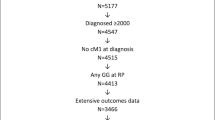Abstract
The use of prostate specific antigen (PSA) in the 1990s has brought on a stage migration of prostate cancer. Despite that, many men have still presented with metastatic prostate cancer in the past decade. The use of primary hormone therapy in the PSA era at a tertiary care Army Medical Center is studied in this paper. Charts were reviewed of 135 men who were diagnosed with metastatic prostate cancer and treated with hormone therapy as a primary treatment between 1989 and 1995. Statistical analysis was used to determine significant predictor variables on the time to disease progression. In univariate analysis clinical stage, pretreatment alkaline phosphatase and nadir PSA values were significant predictors of time to progression. Race and type of treatment were not. In multivariate analysis the relative risk of progression was 3.2 for patients with an alkaline phosphatase >252 and 16.5 for patients with a nadir >2.0. This study supports the argument that racial disparities in prostate cancer outcomes are due to access to care. Furthermore, the survival rate for patients with D-2 disease is better than in the pre PSA studies. Clinical stage, pretreatment alkaline phosphatase and PSA nadir can be used to predict response for those men presenting with metastatic prostate cancer.
This is a preview of subscription content, access via your institution
Access options
Subscribe to this journal
Receive 4 print issues and online access
$259.00 per year
only $64.75 per issue
Buy this article
- Purchase on Springer Link
- Instant access to full article PDF
Prices may be subject to local taxes which are calculated during checkout




Similar content being viewed by others
References
Greenlee RT, Hill-Harmon MM, Thun M . Cancer statistics 2001 CA Cancer J Clin 51: 15–37
Smith RA et al. American Cancer Society guidelines for the early detection of cancer: update of early detection guidelines for prostate, colorectal, and endometrial cancers CA Cancer J Clin 2001 51: 38–75
Moul JW . Treatment options for prostate cancer: Part I-stage, grade, PSA and changes in the 1990s Am J Manag Care 1998 4: 1031–1036
Moul JW . Contemporary hormonal management of advanced prostate cancer Oncology 1998 12: 499–505
Hussain A, Dawson N . Management of advanced/metastatic prostate cancer: 2000 update Oncology 2000 14: 1677–1684
Optenberg SA et al. Race, treatment, and long-term survival from prostate cancer in an equal-access medical care delivery system JAMA 1995 274: 1599
Thompson I et al. African-American ethnic background is an independent and negative predictor of survival in metastatic prostate cancer J Urol 2000 163: (Suppl 4) 56 (abstract no. 242)
Smith JA et al. Serum markers as a predictor of response duration and patient survival after hormonal therapy for metastatic carcinoma of the prostate J Urol 1997 157: 1329
Prostate Cancer Trialists' Collaborative Group. Maximum androgen blockade in advanced prostate cancer: an overview of 22 randomized trials with 3283 deaths in 5710 patients Lancet 1995 346: 265
Pienta KJ et al. Effect of age and race on the survival of men with prostate cancer in the metropolitan Detroit tri-county area, 1973 to 1987 Urology 1995 45: 93
Crawford E et al. A controlled trial of leuprolide with and without flutamide in prostate cancer New Engl J Med 1989 321: 419–424
Denis LJ et al. Maximal androgen blockage: final analysis of EORETC phase III trial 30853. EOERTC Genito-Urinary Tract Cancer Cooperative Group and the EORTC Data Center Eur Urol 1998 33: 144–151
Betanga C et al. Efficacy of the combination of nilutamide plus orchiectomy in patients with metastatic prostate cancer: a meta-analysis of seven randomized, double-blind trials (1056 patients) Br J Urol 1994 73: 396–402
Janknegt RA, Abbou CC, Bartoletti R, Berstein-Hahn L . Orchiectomy and nilutamide or placebo as treatment of metastatic prostatic cancer in a multi-national double-blind randomized trial J Urol 1993 149: 77–83
Eisenberger MA et al. Bilateral orchiectomy with or without flutamide for metastatic prostate cancer New Engl J Med 1998 339: 1036–1042
Caubet JF et al. Maximum androgen blockade in advanced prostate cancer: a meta-analysis of published randomized controlled trials using nonsteroidal antiandrogens Urology 1997 49: 71
Acknowledgements
The authors are supported by a grant from the Center for Prostate Disease Research, a program of the Henry M Jackson Foundation for the Advancement of Military Medicine (Rockville, MD, USA), funded by the US Army Medical Research and Materiel Command.
Author information
Authors and Affiliations
Corresponding author
Additional information
The opinions and assertions contained herein are the private views of the authors and are not to be construed as reflecting the views of the US Army or the Department of Defense.
Rights and permissions
About this article
Cite this article
Koff, S., Connelly, R., Bauer, J. et al. Primary hormonal therapy for prostate cancer: experience with 135 consecutive PSA-ERA patients from a tertiary care military medical center. Prostate Cancer Prostatic Dis 5, 152–158 (2002). https://doi.org/10.1038/sj.pcan.4500551
Received:
Revised:
Accepted:
Published:
Issue Date:
DOI: https://doi.org/10.1038/sj.pcan.4500551



